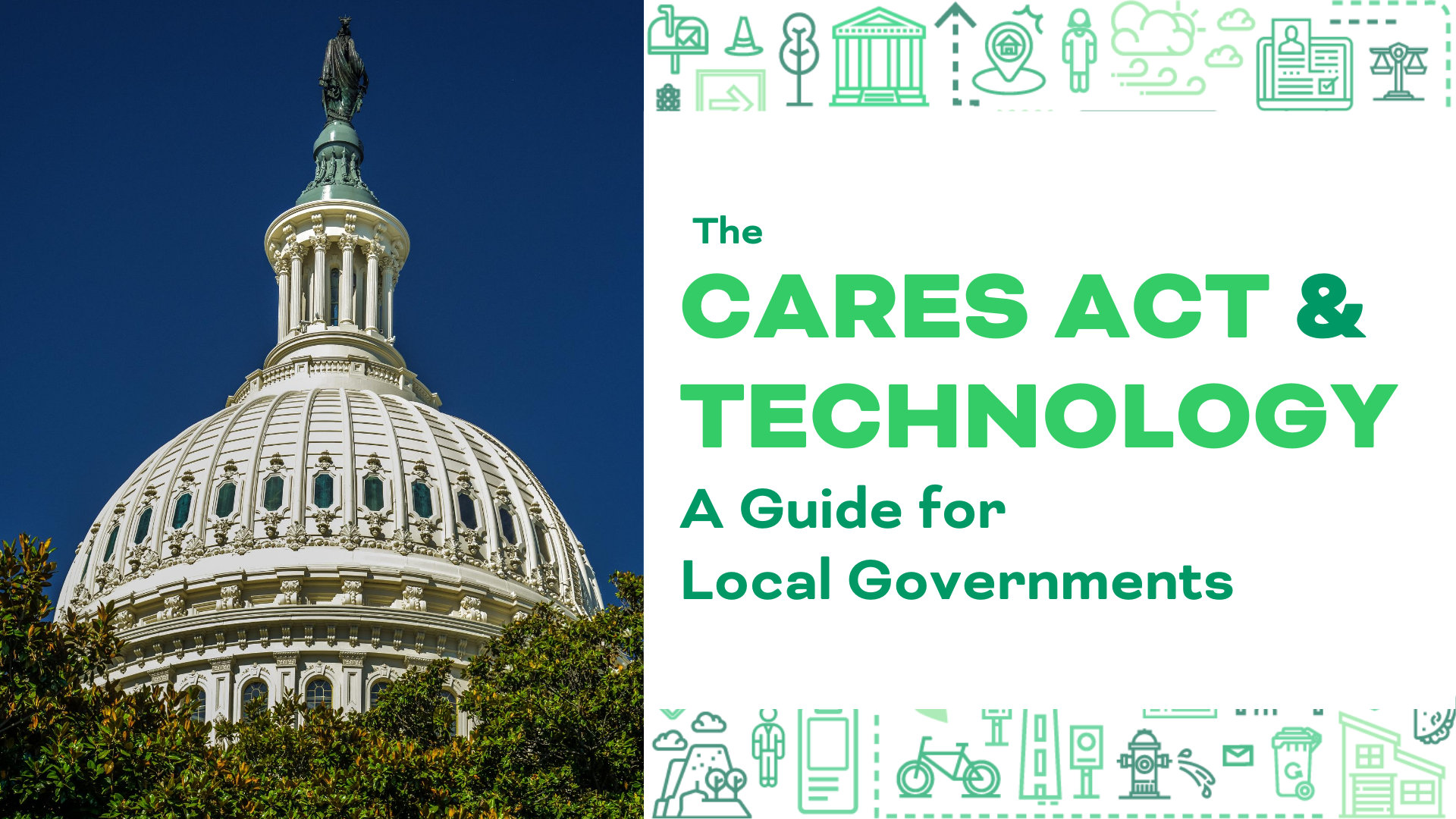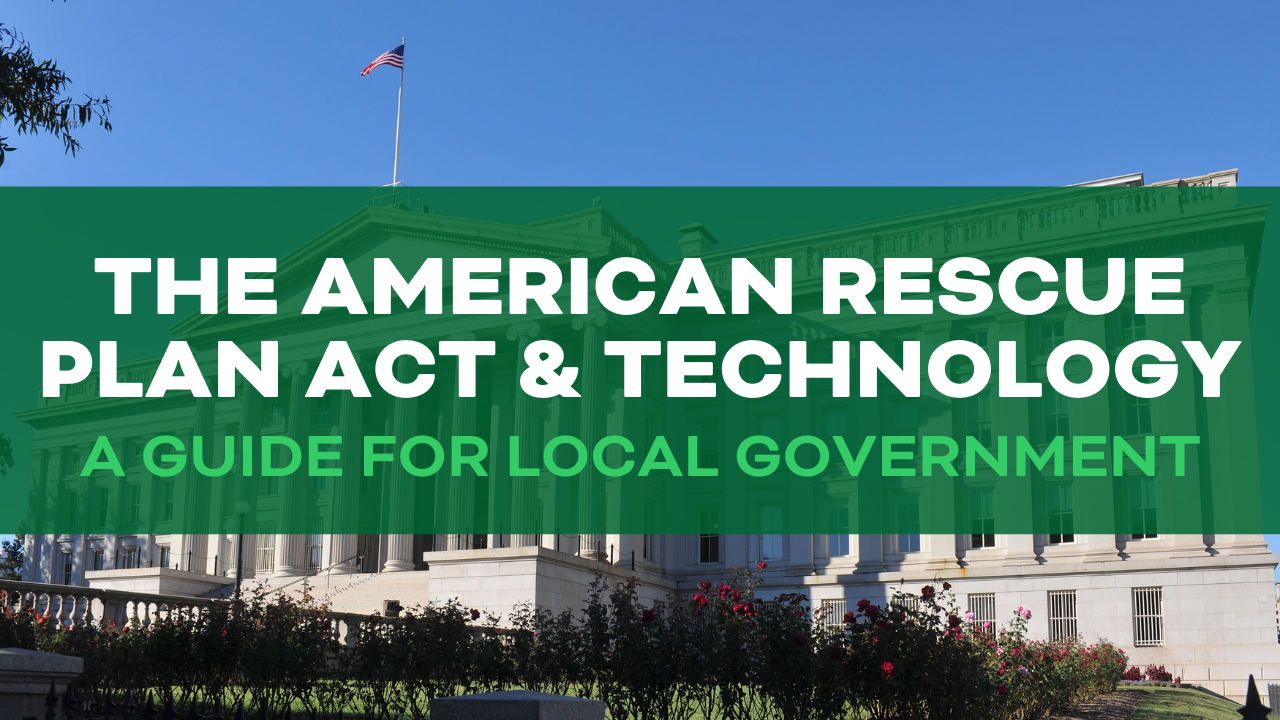

Local governments have stepped up to help residents during the COVID-19 pandemic. Demands for existing and new public services soared amidst an unexpected transition to Telework. Though times are tough for everyone, City and County governments around the country have improved processes, identified needs in the community, and addressed the moment.
But there’s a lot more to do. As the country continues to feel the effects of this public health crisis, many local governments must determine how to rectify lost revenue. Each local organization and the federal government will have to tackle the looming budgetary threat. For now, the CARES Act provides funds that governments can use for expenses related to COVID-19.
Here’s a breakdown of what local governments need to know about CARES Act. We've compiled information about funding in the Act, how that applies to software investments, and examples of how state and local governments are using CARES to serve citizens with technology.

The Coronavirus Aid, Relief, and Economic Security (CARES) Act “provides fast and direct economic assistance for American workers and families, small businesses, and preserves jobs for American industries,” according to the US Department of the Treasury. This economic relief package of over $2 trillion was signed into law on March 27 th , 2020.
For state, local, and tribal governments, the CARES Act established $150 billion for Coronavirus relief. There are three primary areas of guidance for eligible government expenses under the CARES Act. Expenses covered:
$150 billion in CARES act funding for local governments was to be divided among any “…county, municipality, town, township, village, parish, borough, or other unit of general government below the State level with a population that exceeds 500,000.” Here is the list of all eligible counties, cities, and towns.
Once funds are received, local governments can transfer funds to other units of government. For example, a county may transfer the funds it receives to cities, towns, or school districts.
Each unit of government receiving CARES act funding took a different approach to transferring and allocating funds. One common method we saw was funds being sent directly to counties based on their population. From there, the county determined how to divide funding, often based on specific requests from other local governments within its jurisdiction.

On May 11, the U.S. Department of Housing and Urban Development (HUD) announced that it would allocate $1 billion in CARES Act Coronavirus relief funding to state and insular area governments. As part of the Community Development Block Grant (CDBG) program, local governments can use these funds to provide a wide range of public services to prevent, prepare for, or respond to COVID-19.
Experts say yes; you can use CARES act funding for software or technology purchases. You must ensure that your purchase meets the three guidelines provided by the Department of the Treasury, as stated earlier in this article. But if you have identified any new need not already in your budget, it is likely permitted.
For example, if a CRM would help your local government enhance services available to residents and businesses by facilitating online communications, service and information requests, documentation, and payments, that would meet the guidelines.
Ask yourself these questions to determine fit:
How can software help your local government navigate the challenges of the COVID-19 pandemic and serve residents in this time of need? Here are a few examples of software investments that may help you serve citizens:
Collaborative citizen engagement can help your local government get residents the services they need during COVID-19 without creating a massive burden for staff. We’d be happy to show you how.
Here are examples of how local governments are seeking and leveraging new technology to solve COVID-19 problems.
The second major Coronavirus relief bill, passed into law on December 27, 2020, did not include funding for state or local governments. However, this bill did include an extension for the spending of funds under the original CARES Act allocation. The deadline for expenses incurred was extended by one year, from December 30, 2020 to December 31, 2021. This gives local government extra time to allot funds already granted for COVID-19 relief.
Will there be any additional federal funding made available to local governments for COVID-19 support? On March 11, 2021, the third round of Coronavirus economic impact payments known as the American Rescue Plan Act (ARPA) became law. ARPA includes $130.2 billion in direct payments for local government, with its own funding distribution and regulations for spending.
What we do know is that groups like the National League of Cities, the National Association of Counties, and the United States Conference of Mayors are all advocating for additional funding in subsequent phases of relief. These organizations provide a bounty of advocacy resources. We recommend you check out the NLC’s Cities are Essential Resources and the Conference of Mayors’ Fiscal Pain Tracker
We will continue to monitor the situation and provide updates if and when additional policies are implemented.

Local government leaders: see this breakdown of the American Rescue Plan Act to learn about funding in the act, important rules and deadlines, and how cities and counties can use ARPA to serve residents with technology.
Local Government 25 Reasons Why You Should Get Involved with Your Local Government Democracy has long been a defining value in the United States. Now that the presidential…